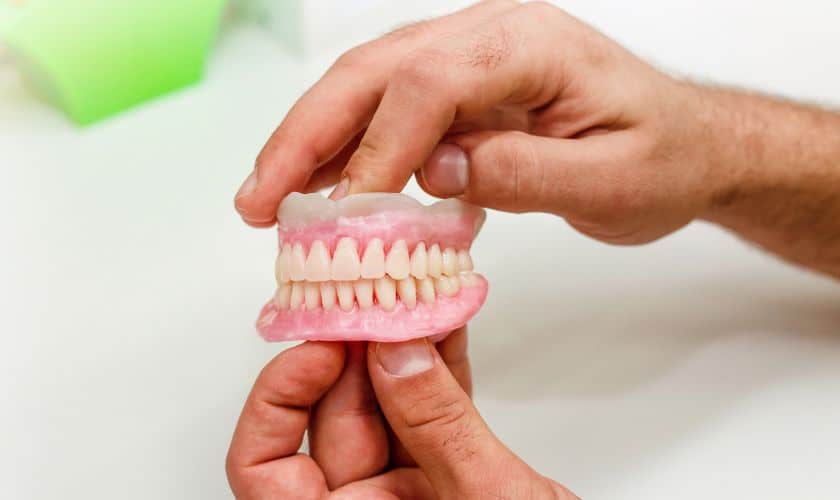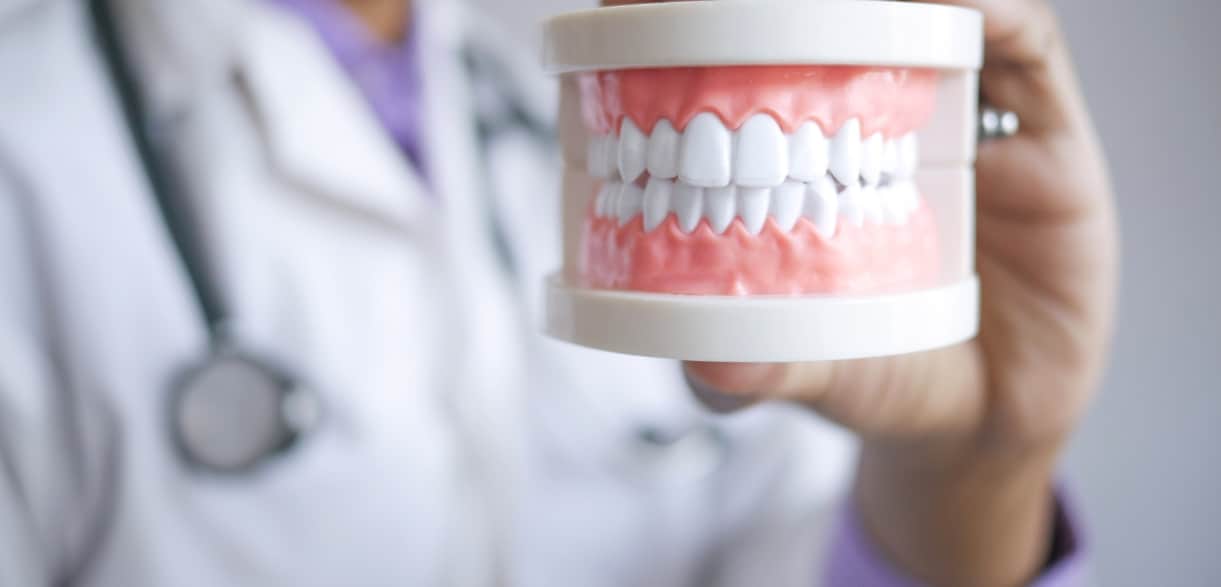
Welcome to a new chapter of your smile, where the journey of dentures begins. Dentures offer a transformative solution for individuals with missing teeth, providing both functionality and aesthetics. This journey encompasses the restoration of your smile, enabling you to regain confidence and enjoy a comfortable oral experience. Dentures are custom-made prosthetic devices designed to replace missing teeth and restore proper chewing and speaking abilities. They come in various types, including full dentures and partial dentures, each tailored to meet your specific needs. Let’s embark on this remarkable journey of dentures, exploring the benefits, process, and the renewed sense of self they bring to your life.
Dentures: Overview
Dentures are removable dental appliances designed to replace missing teeth and restore oral functionality and aesthetics. They are custom-made to fit comfortably in your mouth and are available in two main types: full dentures and partial dentures. Full dentures are used when all teeth are missing, while partial dentures are used to replace multiple missing teeth when some natural teeth remain. Dentures are typically made from acrylic or a combination of acrylic and metal materials, and they are crafted to resemble natural teeth and gums. They provide a functional bite, improve speech, restore facial appearance, and enhance overall quality of life for individuals with missing teeth.

Who needs Dentures?
1. Individuals with Complete Tooth Loss: They are ideal for individuals who have lost all of their natural teeth, whether due to age, decay, gum disease, or injury. Full dentures provide a complete set of artificial teeth to restore oral function and improve appearance.
2. Those with Multiple Missing Teeth: Partial dentures are suitable for individuals who have some natural teeth remaining. They fill in the gaps created by missing teeth, improving chewing ability, speech, and aesthetics.
3. Individuals with Difficulty Chewing or Speaking: If missing teeth make it challenging to chew food properly or affect speech clarity, they can greatly enhance these functions, allowing for improved dietary options and better communication.
4. Those with Jawbone Loss or Gum Disease: Jawbone loss or advanced gum disease can lead to tooth loss. They provide a viable solution for individuals with compromised oral health, restoring their ability to bite, chew, and smile.
5. Individuals Seeking Restored Confidence: They can have a transformative effect on a person’s confidence and self-esteem. By replacing missing teeth and restoring a natural-looking smile, dentures give individuals the opportunity to feel more comfortable and confident in social and professional settings.
Different Types Of Dentures
There are several types of dentures available to meet different needs and situations. The main types of dentures include:
1. Conventional Full Dentures: These are used when all teeth are missing in either the upper or lower jaw. They are custom-made and placed after the remaining teeth have been removed and the gums have healed. They provide a complete set of artificial teeth supported by the gums and underlying bone.
2. Immediate Full Dentures: They are placed immediately after the extraction of remaining teeth. They allow for immediate tooth replacement, so you don’t have to be without teeth during the healing process. However, adjustments may be needed as the gums heal and shrink.
3. Partial Dentures: They are used when some natural teeth remain in the mouth. They consist of replacement teeth attached to a metal or acrylic framework that matches the color of the gums. They are secured in place by clasps that attach to the adjacent natural teeth.
4. Implant-Supported Dentures: They are secured to dental implants surgically placed in the jawbone. These offer increased stability, comfort, and chewing efficiency. They can be used for both full and partial denture options.
5. Overdentures: They are similar to conventional or implant-supported dentures but are designed to fit over a few remaining natural teeth or dental implants. The remaining teeth or implants provide additional stability and support for the denture, improving comfort and functionality.
The specific types are recommended for an individual will depend on factors such as the number of missing teeth, the condition of the jawbone and gums, and personal preferences. It is important to consult with a dental professional to determine the most suitable denture option for your specific needs.
Dentures: Procedure
The procedure for getting dentures typically involves the following steps:
1. Initial Consultation: You will have an initial consultation with your dentist to discuss your oral health, review your dental history, and determine if dentures are the appropriate solution for you. This includes examining your remaining teeth, gums, and jawbone.
2. Dental Impressions: Impressions of your mouth will be taken to create precise molds of your gums and any remaining teeth. These molds will be used as a basis for creating your custom dentures.
3. Selection and Trial: During subsequent appointments, you will work with your dentist to select the shape, size, and color of your teeth. You may also have the opportunity to try a wax or plastic model of the denture for an initial evaluation of fit and aesthetics.
4. Final Denture Fabrication: Once the specifications are determined, the final denture will be fabricated in a dental laboratory. The denture base will be made to resemble your natural gums, and the artificial teeth will be securely attached to the base.
5. Fitting and Adjustments: When your dentures are ready, you will visit your dentist for a fitting. Any necessary adjustments will be made to ensure a comfortable and secure fit. Your dentist will also provide instructions on how to care for and clean your dentures.
6. Follow-up Visits: After receiving your dentures, follow-up visits may be scheduled to monitor the fit, make any additional adjustments, and address any concerns or discomfort you may experience during the adjustment period.
It’s important to follow your dentist’s instructions for wearing and caring for your dentures to maintain their longevity and your oral health. Regular dental check-ups are also necessary to ensure the health of your gums and supporting oral structures.
Maintaining Your Dentures
1. Clean your dentures daily: Remove your dentures and rinse them thoroughly after eating to remove any food debris. Brush your dentures with a soft-bristle toothbrush and non-abrasive denture cleaner or mild soap. Avoid using regular toothpaste, as it can be too abrasive and damage the denture material. Rinse the dentures again before placing them back in your mouth.
2. Handle with care: When cleaning or handling your dentures, place a towel or basin of water in the sink to prevent them from breaking if they accidentally fall. Avoid using hot water, as it can warp the denture shape. Additionally, avoid biting on hard or sticky foods that can cause damage or dislodgement of the dentures.
3. Keep your mouth and gums clean: Even with dentures, it’s important to maintain good oral hygiene. Clean your gums, tongue, and the roof of your mouth with a soft-bristle toothbrush or gauze. This helps remove plaque and stimulates circulation in the oral tissues. Regularly visit your dentist for check-ups and professional cleanings to ensure the health of your gums and detect any issues with your dentures.
Source : kalinjax
In conclusion, dentures provide a transformative solution for individuals with missing teeth, restoring functionality, aesthetics, and confidence. With various types available, dentures offer customized options to meet specific needs. Proper care, regular dental check-ups, and good oral hygiene are crucial for maintaining the longevity and optimal performance, ensuring a comfortable and satisfying experience.
FAQs
1. How long does it take to get used to wearing dentures?
It may take a few weeks for your mouth to adjust to wearing dentures. Initially, you may experience some discomfort or difficulty speaking or eating, but with time, your mouth will adapt.
2. Can I sleep with my dentures in?
It is generally recommended to remove your dentures at night to give your gums and mouth a chance to rest. Removing and properly cleaning your dentures also helps maintain their hygiene.
3. Can I eat normally with dentures?
Yes, you can eat normally with these on. However, it may take some time to adjust to eating certain foods. Start with softer foods and gradually introduce harder, chewier foods as you become more comfortable.
4. Do dentures require adjustments over time?
Yes, it is common for dentures to require adjustments over time. As your mouth changes naturally, the fit of your dentures may become loose or uncomfortable. Regular visits to your dentist for adjustments or relining can ensure a proper fit.
5. How long do dentures last?
The lifespan can vary depending on factors such as wear and tear, oral hygiene, and changes in the mouth. On average, dentures can last 5 to 10 years, but they may need to be replaced or relined as necessary. Regular dental check-ups can help monitor its condition and determine if any modifications are needed.




